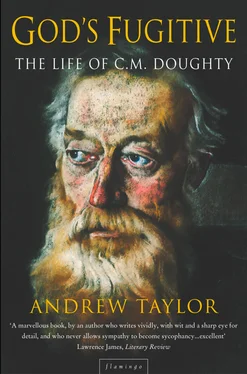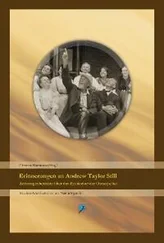What he saw awakened Doughty’s passionate interest in the social and political situation around him, both now and when he returned to Damascus. The Ottoman empire, the ‘disorderly Turkish domination’, was dying on its feet around him, with what he dismissed contemptuously as ‘a handful of degenerate Turks’ uneasily maintaining their rule over some five million Slavs. There was a tense, suspicious mood, with the poverty-stricken Muslims being forcibly conscripted to put down a revolt by Slav peasants in Bosnia and Herzegovina. Doughty himself, wandering through the countryside alone and on foot, was almost picked up as a suspected spy.
Instead of the camel and mule he had relied on to travel in Sinai and up the Jordan valley, he now enjoyed the relative luxury of steamships and, at least as far as the end of the line in Bulgaria, the railway. Elsewhere, rustic horse-drawn carts without springs kept up a brisk eighty miles a day, but offered little comfort over the bumpy roads: ‘The bridges only were bad, and often broken through in more than one or two places, but it was rough work … Sometimes I thought I should have vomited my heart as we dashed at some terrible stone. I stayed at the towns to recover a little,’ he wrote to Henry, far away in the remembered comforts of Theberton Hall.
But he was back in Europe, and there was a clear sense of relief. Restless and threatening as the atmosphere might be, it was still recognizably more like home than the foreign lands he had been travelling through. ‘The aspect of the country is wholly European – it is green and northern. The houses are built a la Franca with pitched roofs and chimneys, the populations mostly Christian,’ he wrote. And when he arrived in the then Hungarian capital of Pest on the Danube, he marvelled at the palatial buildings, the wide streets and the tramways. ‘I was surprised and astonished and pleased at such a new and advanced world,’ he said: eighteen months away had clearly sharpened his appetite for the more relaxed, familiar culture of the west.
They had also sharpened his memories of Theberton. There are few signs of homesickness in his journals, but the letter from home that was waiting for him at the post office in Vienna left him thinking wistfully of the life he had left behind. The renovations had apparently restarted in Theberton Hall, and Henry told him of a garden party and ball he was planning to hold there on 13 September – the very day that his brother collected the letter on the other side of Europe. ‘I calculated the hour an hundred times to think what you ought to be then doing. How could you have got on in the old Pict. Gallery, with a floor of earth and mortar! Finally I am settled here, my limbs ache, I am so weary, and my head also,’ Doughty wrote as he sat alone in his room at the Wandl. In a man who usually appeared so dignified and controlled, it is an appealing human moment of excited nostalgia.
But 13 September 1875 was too busy a day for him to spend much time moping over Theberton and the familiar social excitements of village life. In the same post as his letter home to Theberton he sent off a more formal message to the Royal Geographical Society in London, asking not only for the society’s help in obtaining an official pass from the Ottoman authorities, but also for a grant towards the cost of the expedition. Eight years later he would sit before the members of the society to hear its president, Sir Henry Rawlinson, describe him as being ‘in the front ranks of Asiatic travellers’ after his ‘adventurous and perilous journey’; 45 however, as he hurried hopefully to the Vienna post office, he was no more than an unknown supplicant, using every means he could think of to attract Sir Henry’s favourable attention.
He detailed the journey he had already made through Sinai and north to Damascus: already, he said, ‘without resources and with great fatigue’, he had established that the Sinai peninsula had been only recently raised from the sea; he had found more than 300 ruined cities and villages scattered across the region between Maan and Kerak; and he had personally gathered several specimens of ancient flint tools on the gravel plains to the east of Petra. Doughty, a continent away from London, had no way of finding out what were the special interests of the members of the society’s council: he was at pains to cast his net as widely as he could in order to catch at least somebody’s attention.
Most urgently of all, he told them what he had heard so far of Medain Salih, and what he could hope to find there.
Here are the traces of an unknown people, of inscriptions unknown. Of what interest they are, I think it is manifest. I wish shortly to go down with the pilgrims – they are jealous of that country, where they say no Frank has set foot. I have trusted to the R Geogr Society to obtain the firman necessary … My desire is to return immediately to go with the pilgrims to the discovery of these unknown cities and inscriptions. 46
He had, he said, worked with the society’s cooperation before, and he described his expedition to Norway.
I borrowed from the Socy. at the instance of Sir Rod. Murchison, President, a theodolite with which I measured the daily motions of several Norwegian glaciers, at which time I made other observations of interest to geologists that Sir Chas. Lyell, then preparing the last ed of his Principles, spontaneously visited me to make a number of enquiries and used my assistance largely in that part of his labours …
The word ‘largely’ is something of an exaggeration: whatever help the young graduate was to the eminent Lyell in his ground-breaking study was at best peripheral. But Doughty’s anxiety to impress and his desperation are clear in every hurried line and every dropped name. At last he had found a focus for his study which might win him recognition: as he travelled to Vienna from Damascus, he must have gone over and over the tempting prospect of Medain Salih in his mind. The hardships and the threat of disease he could cope with, but to get permission to set out at all he needed help – and he believed that he deserved it.
If the society could be persuaded to act quickly, a letter of recommendation might be obtained through the embassy at Constantinople within three weeks or so – thus neatly avoiding the unenthusiastic Mr Jago in Damascus. But after five years on the road Doughty was seeking more concrete help.
The cost of the expedition is too much for a man of slender income. I have hitherto lived as a traveller with the Arabs at a small expenditure, but the results are always less than they might have been with sufficient means, added to fatigues which might have been spared in that penetrating climate, a country now ravaged by cholera …
He had, he said, already asked the British Association for a contribution of £100, but his letter might have gone astray; would the Royal Geographical Society support him with one of its grants?
He signed the letter as formally, and as graciously, as he could – ‘I am Sir, hoping at some future time I may have the pleasure to know you, your obedt. servant, Charles M. Doughty, MA, Cambridge, of Theberton Hall, Suffolk.’ After his gruelling time as a despised, homeless wanderer, it was clearly time to play once again the part of a country gentleman of standing.
He submitted a report on his wanderings in Sinai, and on his hopes from Medain Salih, for the Viennese Geographical Society. 47 He wrote knowledgeably of the topography and geology of the region: the whole peninsula, he believed, had only recently been thrust up out of the sea, a parched land that had been formed by the buffeting and erosion of long-dried-up torrents of water and retreating tides.
But his real interest was in the mysterious ‘mosquito huts’, the ruins scattered through the mountains of Edom, and, best of all, the stories he had heard of the lost cave cities of Medain Salih. Doughty described with enthusiasm the discoveries he had already made about them at second-hand, through the tales of the Arabs he had met, and was frank about the urgency with which he wanted to set off to see them for himself. ‘I don’t doubt the existence of such towns; I’ve heard about them from about a hundred people, who … all report in the same fashion. They resemble the former cliff town Petra, and are of the same ilk, as if they had been built by the same master builders …’ 48
Читать дальше












